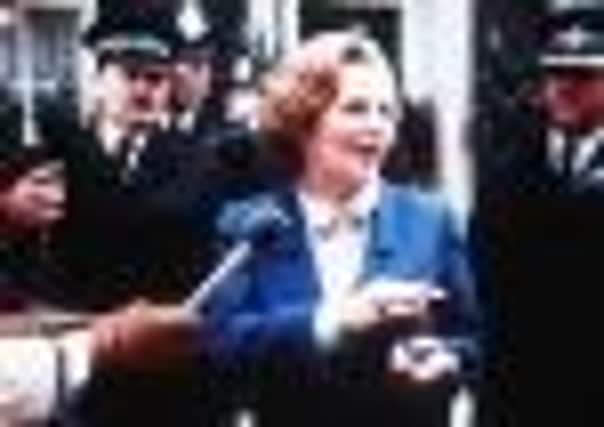Thatcher doubted miners’ support of Scargill


The Prime Minister made the comments in an “off the record” interview with Sunday Express journalists in December 1981, less than three years before Mr Scargill led miners in a strike which socialist historians say resulted in the “most important defeat for the trade union movement” in more than half a century, files show.
Interview notes record how Mrs Thatcher asked whether she sounded “too patronising” when describing her feelings about “the miners”.
Advertisement
Hide AdAdvertisement
Hide AdShe is noted as saying: “I have a lot of faith in the miners let me say. They know. They know where the extra money comes from. And I think they are basically reasonable people. That sounds too patronising?”
“They will think about their neighbours. I really do believe that, genuinely. Don’t put this down. My feeling about it was always that they will vote for Scargill because they recognise a very skilful and good negotiator. But I don’t think they would follow him in trying to have a row with government. I really don’t.
“I don’t think they will follow him on the political motivation.”
A Trades Union Congress history of the 1984 strike says the Conservative Government used its “limitless resources” to defeat strikers.
Advertisement
Hide AdAdvertisement
Hide Ad“The Conservative government’s long-term agenda, the privatisation of the energy sector, required a restructuring of the coal industry. An attempt at large-scale closures in 1981 was dropped when unofficial strikes spread rapidly and government ministers found themselves unprepared to fight at the time. This situation had changed by 1984,” it says.
“In March 1984, when five pits were announced for closure without proper review, official area strikes started in Yorkshire and Scotland. These were endorsed by the NUM executive which called on other areas to support them.
“It believed that there was a large hit list of vulnerable pits and that a stand had to be taken before the heart was ripped out of the industry and coal communities were shattered.
“The Government used its limitless resources (particularly the deployment of police on a national stage) to defeat the miners.”
Advertisement
Hide AdAdvertisement
Hide AdThe history adds: “Played out nightly on television screens for the rest of the nation, it became a titanic struggle lasting until March 1985 when, by the tiniest margin, a majority of conference delegates voted to return without a new agreement on managing closures in order to control the unorganised drift back to work and to salvage the union.
“During the strike 11,291 people were arrested, of whom 8,392 were charged, mainly for breach of the peace, obstructing the police and obstructing the highway.
“This was without doubt the most important defeat for the trade union movement since the collapse of the General Strike in 1926.”
The same 1981 papers also reveal Mrs Thatcher warned Chancellor Sir Geoffrey Howe that he could be “for the chop”.
Advertisement
Hide AdAdvertisement
Hide AdSir Geoffrey, now Lord Howe, also served as Foreign Secretary and was then a major figure in the Conservative Government.
He disagreed with Mrs Thatcher over the Government’s attitude to Europe and his resignation in 1990 is thought to have triggered her downfall.
Historian Chris Collins, who works for the Margaret Thatcher Foundation, thinks that the 1981 reference may the first sign of Mrs Thatcher’s “distrust” of Sir Geoffrey, now 85.
Sir Geoffrey is mentioned in 1981 diary entries written by Mrs Thatcher’s economic adviser Alan Walters. In a January 6 entry, Mr Walters describes a meeting with Mrs Thatcher and includes the note: “What should she do about Geoffrey. Who could she promote. No one.”
Advertisement
Hide AdAdvertisement
Hide AdOn February 23, Mr Walters notes how she warned Sir Geoffrey “that he must get the PSBR (Public Sector Borrowing Requirement) down or ‘you are for the chop’.”
Sir Geoffrey resigned as Deputy Prime Minister in November 1990.
• Margaret Thatcher’s 1981 Christmas card list gives an insight into the way Britain’s view of the world has changed over 30 years.
Foreign heads of state who received seasonal greetings from Mrs Thatcher in 1981 included Libyan dictator Muammar Gaddafi and Iraqi dictator Saddam Hussein.
Advertisement
Hide AdAdvertisement
Hide AdGaddafi was killed in October 2011 after current Conservative Prime Minister David Cameron ordered the RAF to mount air raids in support of a rebel uprising in Libya. Saddam was hanged in 2006 following the 2003 invasion of Iraq by British and American troops.
The 1981 Downing Street Christmas card featured a photograph of Mrs Thatcher and husband Denis in front of a Christmas tree at Chequers.
Satirist John Wells’s stage farce Anyone for Denis? was popular and Mrs Thatcher worried that the card would be seen as a “caricature”.